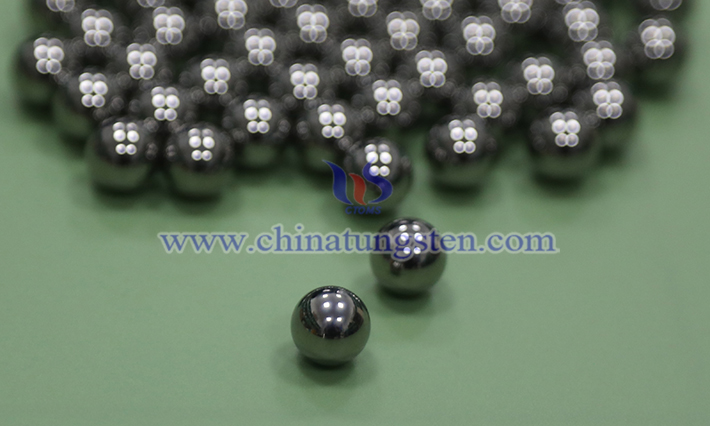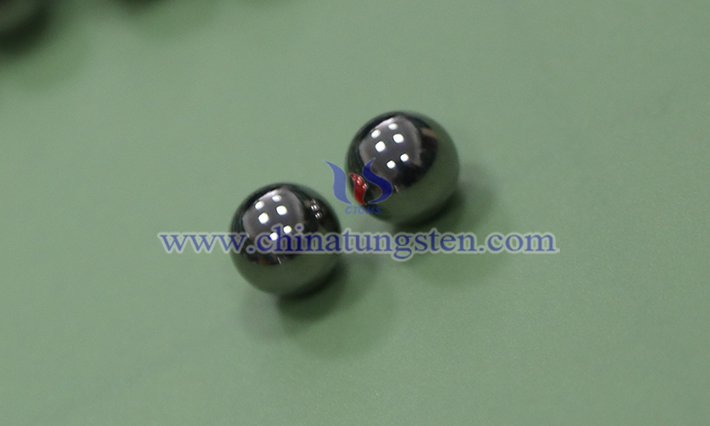Mechanical Properties of Tungsten Cemented Carbide Balls
- Details
- Category: Tungsten Information
- Published on Friday, 12 September 2025 17:18
Tungsten cemented carbide balls are characterized by high hardness, high compressive strength, moderate flexural strength, low impact toughness, and excellent wear and corrosion resistance. This comprehensive combination of mechanical properties makes them an ideal material for high-load, harsh working conditions.
1. Hardness: Ultra-High Hardness, Excellent Wear Resistance
Value Range: Tungsten cemented carbide balls typically have a hardness of ≥90.5 HRA (Rockwell A Scale), with some products reaching HRC 80-90 (Vickers hardness approximately 1800-2200 HV), far exceeding high-speed steel (HRA 82-87) and tool steel (HRC 60-65).
Performance: The high hardness maintains a sharp edge and reduces wear during high-speed cutting, grinding, stamping, and other processes. For example, tungsten cemented carbide balls have a wear resistance dozens to hundreds of times greater than that of traditional steel balls, and can withstand high-load friction for extended periods without failure.
Applications: Suitable for machining hard materials (such as hardened steel, stainless steel, and titanium alloys) or sticky materials (such as aluminum alloys and copper alloys), reducing tool sticking and improving machining precision.

2. Compressive Strength: Extremely High, Resistant to Impact Loads
Value Range: The compressive strength of tungsten cemented carbide balls can reach 3500-5600 MPa, with hot isostatically pressed products exceeding 6000 MPa, over 200 times that of hardened alloy tool steel (24-26 MPa).
Performance: High compressive strength enables them to withstand extreme pressures without breaking. For example, tungsten cemented carbide balls can operate stably and long-term in high-pressure stamping, deep-hole drilling, or heavily loaded rolling bearings.
Influencing Factors: Cobalt content significantly affects compressive strength. Compressive strength reaches its peak at a cobalt content of 5%. Fine-grained carbide has higher compressive strength than coarse-grained products.
3. Flexural Strength: Medium, controlled by composition and processing.
Value Range: Common tungsten-cobalt (YG) tungsten cemented carbide balls have a flexural strength of 1200-2500 N/mm², tungsten-titanium-cobalt (YT) balls have a flexural strength of 1150-1430 N/mm², and tungsten-titanium-tantalum-cobalt (YW) balls have a flexural strength of 1200-1350 N/mm².
Performance: Flexural strength reflects a material's ability to resist bending fracture. For example, YG20 cemented carbide balls have a flexural strength of up to 2500 N/mm² and are suitable for applications requiring a certain degree of toughness (such as wire drawing dies and rollers).
Influencing Factors:
Cobalt Content: The higher the cobalt content, the higher the flexural strength (e.g., YG8N has a flexural strength 25% higher than YG8).
Grain Size: Coarse-grained carbide has a higher flexural strength than medium-grained products, but fine-grained products have greater toughness. Defect Control: Defects such as pores and cracks significantly reduce flexural strength, so the sintering process requires strict control.

4. Impact Toughness: Low, but can be optimized through composition
Value Range: The impact toughness of tungsten cemented carbide balls is approximately 1/9 that of annealed steel at room temperature, and even lower at high temperatures (only a few hundredths of that of steel).
Performance: Low impact toughness leads to brittle fracture of tungsten cemented carbide balls under impact loads. Therefore, their use alone should be avoided in environments subject to severe vibration or frequent impact.
Optimization Directions:
Increasing Cobalt Content: Increasing the cobalt content can improve impact toughness (for example, YG20 has better toughness than YG6).
Adding Toughening Phases: Small additions of TaC, NbC, etc. can refine the grain size and improve toughness.
Gradient Structure: A design with high cobalt content on the surface and low cobalt content in the core improves fracture resistance.
5. Wear and Corrosion Resistance: Significant Overall Advantages
Wear Resistance: The wear resistance of tungsten cemented carbide balls stems from their high hardness and chemical stability. For example, when machining aluminum alloys, its lifespan is over 10 times that of high-speed steel balls.
Corrosion Resistance: It exhibits some resistance to acids, alkalis, and other chemicals, with nickel-containing cemented carbides performing better in corrosive environments. However, it should be noted that WC is susceptible to oxidation at temperatures above 600°C and requires protection with a coating (such as TiAlN).
6. Thermal Expansion Coefficient and Density: Stable Physical Properties
Thermal Expansion Coefficient: 4-7×10⁻⁶/°C. This low thermal expansion rate provides excellent dimensional stability during temperature fluctuations, making it suitable for precision machining.
Density: Approximately 14.85-15.5 g/cm³. Its high density imparts excellent thermal conductivity and vibration resistance.
- Chinatungsten Online: tungsten-carbide.com.cn
- CTIA GROUP LTD: en.ctia.group
- Tungsten News & Price: www.ctia.com.cn
- Molybdenum News & Price: news.molybdenum.com.cn
- Tel.: 86 592 5129696; Email: sales@chinatungsten.com



 sales@chinatungsten.com
sales@chinatungsten.com